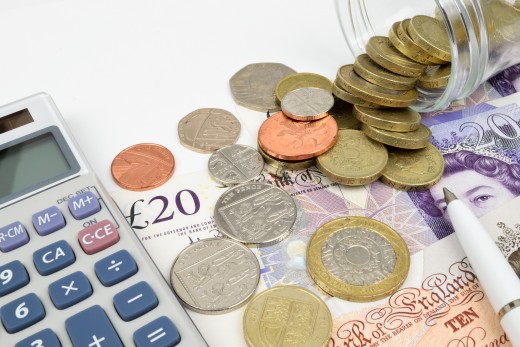What Impact Does Your Savings Habit Have on Your Future?

Today, in Britain, we’re not saving as much as we used to save in the past. The Office of National Statistics, the government body which publishes many of the statistics you read in newspapers about Britain and British life, reported that, in 2017, the household savings ratio fell to just under five per cent – that was the lowest figure recorded since 1963, when they first started measuring household savings ratios (source: Independent).
It follows a decade in which the amount we save and spend as consumers were hit because of falling levels of disposable income (the money that we have left after tax and the bills that must be paid). It was the first time since the economic turmoil of the 1970s that disposable income had fallen for three quarters in a row (source: BBC News). Consumer borrowing, including on no guarantor loans, has rocketed since the Great Crash of 2008-2009.
It’s harder to save money than ever but it’s definitely worth trying. It can be hard sometimes to worry about how we’re spending money day to day when there are so many other things going on in our lives but, sometime in the near future, you should try to:
- Use comparison sites to save money on your utility and insurance bills
- Ask your landlord for a rent reduction or swap your mortgage for a cheaper one
- Shop at cheaper supermarkets (some of the food there is delicious and, if you’ve never shopped at one, you’ll be really surprised by the choice on offer nowadays)
- Scour the internet and discount shops for cheaper prices on both the things you normally buy and on one-off expenses
- Take packed lunches and flasks of coffee into work rather than spending them at the local Costa, takeaway, or supermarket
Those 5 small changes to your life could save you up to £5,000 a year. That’s £5,000 in your pocket and not in anyone else’s bank account. There are ways to make extra money too and they include:
- Ask your boss for a rise or for extra hours if work seems to be going well at the moment
- De-clutter! Get rid of the stuff you don’t need anymore because remember that one man’s trash is another man’s treasure!
- Consider ways to top up your income like becoming an Uber driver, freelancing, or drop shipping. Work you do in the hours you’re not at work is called a “side hustle” and millions of Brits are earning real money on their side hustles which makes life a lot easier.
When you’re only spending the money you need to spend and you’re making more than you’re currently making, amazing things start to happen. And, in this article, readers can look at the impact of being able to save money has on their immediate future and the long-term future.
Thinking really long term, you’ll have a nicer retirement
Did you know that you can save and invest up to £20,000 a year and pay no tax on the profits you make from those savings and investments with Individual Savings Accounts? You can also earn up to an additional £1,000 a year tax-free on savings.
You might want to use the money you’re saving to put into your pension pot. Under the new pensions-at-work system that started rolling out in 2012, your employer has to pay up to 3% of your salary from their own pocket into your pension pot if you have a workplace pension. If you save 5% and they pay in 3%, that’s a tiny amount of money you’re saving and you don’t pay any tax on it while you’re building your pension pot up (subject to annual and lifetime limits).
Ready for life’s challenges
You might get married, you might have children, or you might have an unexpected and large bill to meet in a hurry.
Without savings, you’ll struggle – everybody would struggle to cope with such big changes in their lives without a pool of cash saved up.
At the moment, you might want to look for a loan without guarantor to help you pay for these often out-of-the-blue life changes.
What if you lose your job?
Sometimes it’s the economy and sometimes it’s because of bad company management. Whatever the reason for losing a job, it’s an incredibly stressful time of life, particularly if you have been with the same employer for a long time now.
That’s one of the reasons we strongly encourage you to develop your own side hustles to help you cope with periods when you are out of work. A side hustle will meet some of your bills but not all of them – if you start a savings habit, you’ll have your own buffer to help you navigate out of trouble.
Financial independence
Imagine logging onto your online bank and seeing very few or no direct debit payments going out to loan companies, on credit cards, on store cards, or on servicing your overdraft. Better still, imagine that there’s money left over at the end of the month you can put into a pension, an ISA, or a quick-access savings account.
By spending your money carefully and by making the most of every opportunity which comes your way, you can cut the cord between you and finance companies once and for all.
And what could you save for? A deposit on a house? A deposit on holiday home? Or even buy a new car outright? Having savings gives you choice and control and what you spend your savings on is all about you exercising that choice and control.
Whilst you’re saving
We’d love to hear your stories about what saving money every month has allowed you to do. But remember that you don’t go from a position of having no savings to having lots of savings overnight – it’s a gradual process but it’s worth it.
Savings can always help you during urgencies. Being financially independent keeps you prepared for the unforeseen expenses. Putting aside a small amount of money every month can prove to be beneficial for your future endeavours.
Financial planning plays a dominant role in your life. Always conduct thorough research and consult any legal financial advisor if you need any help in mapping out a plan to start with. Having a stable financial life will make a variety of things easier for you.
This article is accurate and true to the best of the author’s knowledge. Content is for informational or entertainment purposes only and does not substitute for personal counsel or professional advice in business, financial, legal, or technical matters.
© 2019 Shuvam Samal








